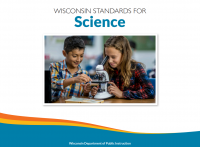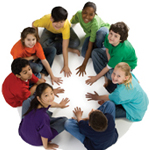Science Standards - Up for Review
 Our state science standards are now up for review. You can add feedback here through August 5th. We need to decide if we want to keep them as is in order to maintain alignment to the national NGSS and current instructional materials or make changes in order to add or take away particular knowledge and skills.
Our state science standards are now up for review. You can add feedback here through August 5th. We need to decide if we want to keep them as is in order to maintain alignment to the national NGSS and current instructional materials or make changes in order to add or take away particular knowledge and skills.
A Vision for Science Education
![]()
![]() In a world of continual innovation and discovery, all students across Wisconsin must have the ability to apply scientific thinking, skills, and understanding to real-world phenomena and problems. Therefore, student learning must include experiences requiring that type of work. Our students, our communities, and our state need scientifically literate citizens who can make informed decisions, help sustainably manage our abundant resources, and move our economy forward.
In a world of continual innovation and discovery, all students across Wisconsin must have the ability to apply scientific thinking, skills, and understanding to real-world phenomena and problems. Therefore, student learning must include experiences requiring that type of work. Our students, our communities, and our state need scientifically literate citizens who can make informed decisions, help sustainably manage our abundant resources, and move our economy forward.
The National Research Council issued A Framework for K-12 Science Education (2012), succinctly laying out an expectation for high school graduates that we have adopted as the vision for science education in Wisconsin: “[By] the end of 12th grade, all students have some appreciation of the beauty and wonder of science; possess sufficient knowledge of science and engineering to engage in public discussions on related issues; are careful consumers of scientific and technological information related to their everyday lives; are able to continue to learn about science outside school; and have the skills to enter careers of their choice, including (but not limited to) careers in science, engineering, and technology.” Educators should work with their colleagues and communities to create their own visions for science education based on their unique contexts.
 To accomplish this vision, all students must have access to rigorous, standards-based science instruction that connects to their communities and cultures. The Wisconsin Department of Public Instruction, along with science education organizations around the state, continue to emphasize equitable and accessible learning for all.
To accomplish this vision, all students must have access to rigorous, standards-based science instruction that connects to their communities and cultures. The Wisconsin Department of Public Instruction, along with science education organizations around the state, continue to emphasize equitable and accessible learning for all.
Resources for Science Educators
- Science Standards - provides links to the 2017 Wisconsin Standards for Science (WSS), as well as resources to understand the standards and support implementation
- Science Assessment - provides the latest news and resources related to the state Forward Exam, effective classroom science assessment aligned to the WSS (and NGSS), and strategies for creating strategic systems of assessment
- Elementary Science Resources - ideas on the why and how of implementing elementary science
- Equity and Access - resources related to equity and access in science education, the DPI/WSST position statement related to equity in science, and connections to diverse scientists and information about historical bias in science
- Science Disciplinary Literacy - links to resources and learning curated and created by Wisconsin educators
- Social Media Connections - has links to the DPI science blog, twitter account, Google+ community, and archives of past resource/opportunity emails
- Science Equivalency - information and links related to having a CTE course count for science credit
- Evaluating Science Materials - a few tools and ideas to support work in evaluating instructional materials
- Science Inquiry - a 2016 report from DPI and the American Institutes for Research/MWCC detailing changing notions of scientific inquiry, particularly noting how there is no set "scientific method" and detailing what inquiry looks like in the WSS/NGSS